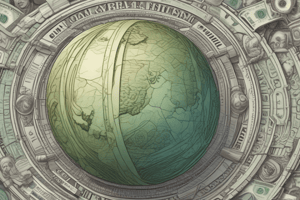Podcast
Questions and Answers
Banks primarily take in funds as deposits and lend them out to borrowers.
Banks primarily take in funds as deposits and lend them out to borrowers.
True (A)
Bank reserves are the maximum cash that a bank can lend out to borrowers.
Bank reserves are the maximum cash that a bank can lend out to borrowers.
False (B)
Excess reserves are the additional cash that a bank lends out to customers.
Excess reserves are the additional cash that a bank lends out to customers.
False (B)
Bank reserves are meant to ensure that every bank can meet any large and unexpected demand for withdrawals.
Bank reserves are meant to ensure that every bank can meet any large and unexpected demand for withdrawals.
Trust functions are one of the topics discussed in bank debt valuations.
Trust functions are one of the topics discussed in bank debt valuations.
Letter of credit financing is a key function of banks according to the text.
Letter of credit financing is a key function of banks according to the text.
Short-term loans generally run between three to five years.
Short-term loans generally run between three to five years.
Intermediate-term loans are paid in annual installments from a company’s cash flow.
Intermediate-term loans are paid in annual installments from a company’s cash flow.
Long-term loans can last up to 25 years.
Long-term loans can last up to 25 years.
Balloon loans have equal installment payments throughout the loan term.
Balloon loans have equal installment payments throughout the loan term.
Term loans are repaid in regular instalments known as EMI.
Term loans are repaid in regular instalments known as EMI.
Short-term loans are usually offered to firms that qualify for a line of credit.
Short-term loans are usually offered to firms that qualify for a line of credit.
A gold reserve is the gold held by a national central bank to support the value of the national currency.
A gold reserve is the gold held by a national central bank to support the value of the national currency.
Bank reserves are the amount of cash that banks keep on hand as a fraction of their assets.
Bank reserves are the amount of cash that banks keep on hand as a fraction of their assets.
A trust receipt is a type of loan where a lump sum of money is borrowed and paid back periodically with interest.
A trust receipt is a type of loan where a lump sum of money is borrowed and paid back periodically with interest.
Term loans are suitable for businesses that need to acquire equipment or assets to start their operations.
Term loans are suitable for businesses that need to acquire equipment or assets to start their operations.
A central bank can increase bank reserve requirements to boost economic growth.
A central bank can increase bank reserve requirements to boost economic growth.
Revolving credit lines allow businesses to make a number of new loans without restrictions.
Revolving credit lines allow businesses to make a number of new loans without restrictions.
Flashcards are hidden until you start studying
Study Notes
Bank Reserves
- Bank reserves refer to the amount of cash that banks must keep on hand as a fraction of their customers' deposits to ensure they can meet their liabilities in case of sudden withdrawals.
- Central banks can use bank reserve levels as a tool in monetary policy, either by lowering the reserve requirement to stimulate economic growth or increasing it to slow down economic growth.
Gold Reserves
- A gold reserve is the gold held by a national central bank, mainly as a guarantee to redeem promises to depositors, note holders, or trading peers.
- In the Philippines, gold reserves averaged 188.93 Tonnes from 2000 to 2023, with a high of 274.42 Tonnes in 2003 and a low of 126.89 Tonnes in 2007.
Loan/Credit Products
- Term loans involve borrowing a lump sum of money that a business pays back periodically with interest, ideal for acquiring equipment or assets to start operations.
- Types of term loans include short-term loans (less than a year), intermediate-term loans (1-3 years), and long-term loans (3-25 years), each with varying repayment terms and collateral requirements.
Bank Functions
- Banks act as intermediaries between depositors and borrowers, taking in funds and lending them to those who need them.
- Bank functions include taking deposits, making loans, providing foreign exchange services, trust functions, and letter of credit financing.
Trust Receipt Financing
- Trust receipt financing is a type of loan where the lender takes possession of the goods or assets while the borrower retains ownership.
Letter of Credit Financing
- Letter of credit financing involves a guarantee from the bank to the seller that the buyer will pay for the goods or services.
Bank Reserves (Again)
- Excess reserves are the additional cash that a bank keeps on hand and declines to lend out, kept to prevent panic in case of large withdrawals.
- Cash reserves requirements are intended to ensure that every bank can meet any large and unexpected demand for withdrawals.
Studying That Suits You
Use AI to generate personalized quizzes and flashcards to suit your learning preferences.




